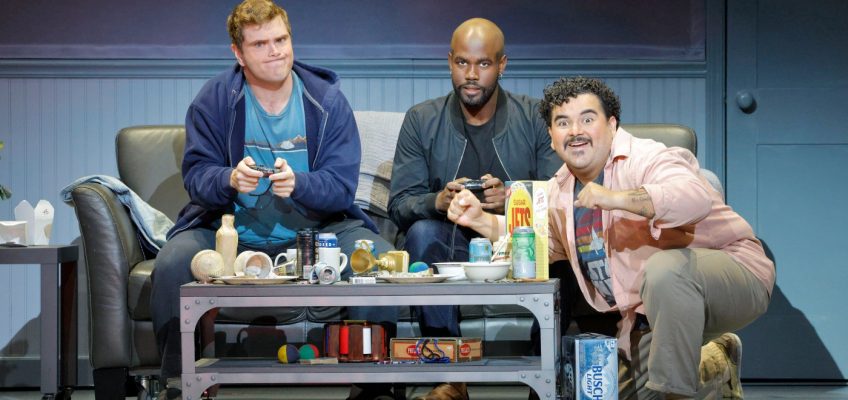Dating nightmares make for cynical comedy in Minnesota Opera’s production of Wolfgang Amadeus Mozart’s “Così fan tutte.” Under Doug Scholz-Carlson’s direction, the ending is put in the hands of the audience, who vote on how the ridiculous plot resolves.
“Così fan tutte” was Mozart’s third collaboration with librettist Lorenzo Da Ponte, after “The Marriage of Figaro,” and “Don Giovanni.” Some themes from those earlier works reappear in the new collaboration — questions of infidelity and amorality, for example. In “Così fan tutte,” Da Ponte satirizes notions of romance and leans into the trope that women are inherently fickle.
Scholz-Carlson’s staging pushes against the deep misogyny of Da Ponte’s libretto by accentuating the buffoonery of the two male romantic leads.
Ángel Vargas as Ferrando and David Wolfe as Guglielmo play their roles as complete doofuses. From the first scene where they play video games while drinking Busch Light with their friend Don Alfonso (John Mburu), the two young men act like dude bros with their sporty look and lack of world wisdom.
It’s a wonder Fiordiligi (Kylie Kreucher) and Dorabella (Kara Morgana) ever found these nincompoops marriageable in the first place.
The men are easily persuaded by Don Alfonso, who believes all women are cheaters, to stage an elaborate ruse to trick their partners. Each disguises himself in beards and less preppy attire (the women wonder if they are hippies or lumberjacks), and woo each other’s opposite partner.
Their machinations carry a flaw: In tricking their fiancées to find out if they are trustworthy, they prove themselves untrustworthy. That ironic twist fits into a broader satirization of traditional norms and morals, implying a rather libertine view that faithfulness is impossible, at least as far as women are concerned.
Related Articles
Review: Mixed Precipitation’s zany production fuses Mozart’s classic opera with doo-wop music
Of the four leads, Vargas and Kreucher get the most solo moments. In “Rivolgete a lui lo sguardo,” Vargas demonstrates vulnerability, while Kreucher’s technical ability shines in the challenging, octave-jumping aria “Come scoglio,” when Fiordiligi anguishes over her temptation to flirt with Ferrando.
They also make two parts of a trio that also features Don Alfonso, in one of the opera’s highlights.
As the sassy employee at Fiordiligi and Dorabella’s firm, Despina gets two arias as well which she uses to encourage her employers to flirt outside their primary relationships. Lindsay Ohse steals more than a few scenes not only with her singing, but her comic ability as well, including disguising herself as a doctor and a notary along the way.
When singing together, Kreucher and Morgana’s voices blend wonderfully, capturing Mozart’s delightful harmonies with lightness. There are also a number of excellent quartets and sextets throughout, where the characters bring Mozart’s complex melodies and vocal structures to life.
The design team has created a sleek, mod look. Paul Whitaker’s settings feature huge picture windows and minimalist furniture, while Amber Brown’s costume design recalls an early 1960s aesthetic in its contemporary looks. Wig, hair and make-up designer Emma Gustafson, meanwhile takes on the task of making our two male heroes terrible disguises just believable enough to fool their partners.
This production of “Così fan tutte” allows Mozart’s score to sparkle, even as the story’s games of love and deceit paint a rather bleak picture of love in the world today.
Who: The Minnesota Opera
What: Così fan tutte
When: 7:30 p.m. Thu., Nov. 6, Sat., Nov 8, and 2 p.m. Sunday, Nov 9,
Where: The Ordway, 345 Washington St. Saint Paul
Tickets: $31-$273 at mnopera.org.
Accessibility: Elevators access all floors of Concert Hall, accessibility seating for all mobility devices (request when buying tickets); service animals welcome (inform ticket representative); listening units and large print available upon request. One single occupancy, accessible restroom in the Music Theater lobby. Ordway.org/visit/accessibility.
Capsule: Minnesota Opera accentuates the satire in its “Così fan tutte.”


Leave a Reply